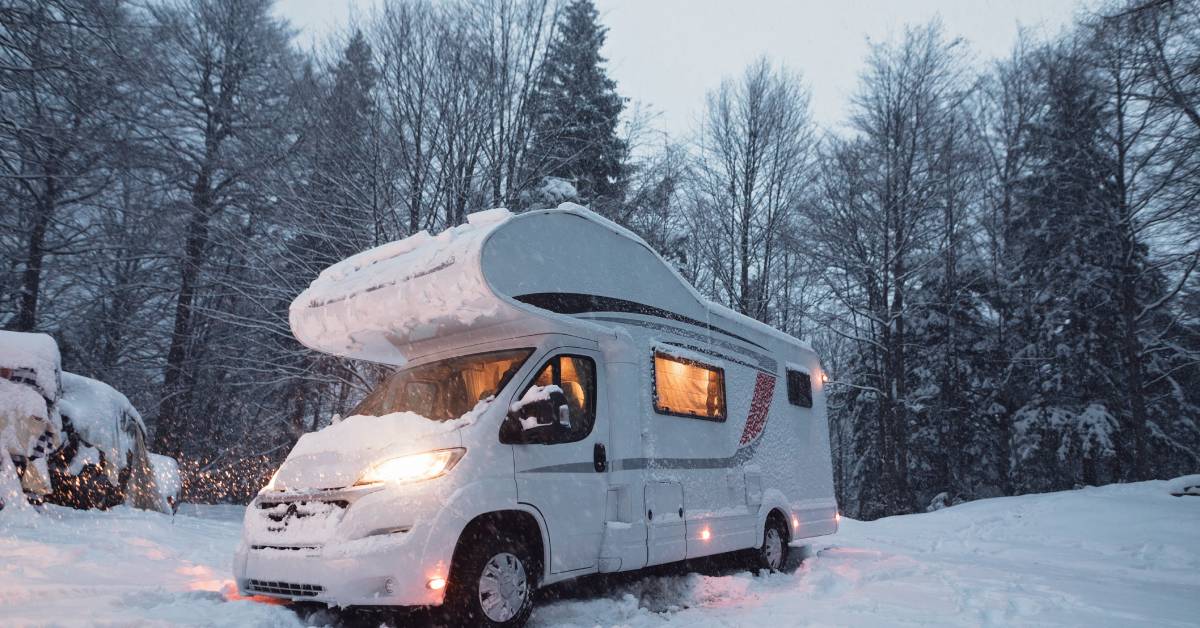Mistakes To Avoid When Storing Your RV This Winter
—
January 8th, 2025

Many RV owners enjoy the freedom and adventure of spring and summer travel. However, when winter rolls around, they prefer to tuck away their homes on wheels and settle down for a few months.
Proper winter storage will keep your RV in top condition for next season’s adventures. Let’s dive into the top mistakes to avoid when storing your RV this winter.
1. Forgetting To Winterize the Plumbing System
Neglecting to winterize your RV’s plumbing system is one of the most common and costly mistakes you can make. As temperatures drop, water left in the pipes, tanks, or water heater can freeze. Frozen water expands, potentially leading to cracked pipes, busted tanks, and significant repair bills come spring.
To avoid this, thoroughly drain all water from your RV’s plumbing system. Start by emptying the fresh, gray, and black water tanks. Next, flush the system with antifreeze designed for RV use. Run the antifreeze through all faucets, showers, and toilets to protect every pipe.
Taking these steps might feel tedious, but it’s far easier (and cheaper) than repairing a plumbing system damaged by freezing temperatures. Properly winterized plumbing ensures peace of mind all winter long.
2. Skipping Roof Maintenance
Ignoring your RV’s roof before storage can lead to leaks and costly damage. Over time, the roof can develop cracks, loose seals, or other vulnerabilities that allow moisture to seep in and cause interior water damage. Snow and ice accumulating on a compromised roof can exacerbate the issue.
Inspect the roof thoroughly before storing your RV. Check for any cracks, soft spots, or worn-out seals around vents, air conditioners, and other openings. Reseal any problem areas with a quality RV roof sealant.
Once you’ve sealed the roof, consider investing in an RV cover designed for winter weather. These covers protect the roof from snow, ice, and UV damage while keeping debris out.
3. Leaving Food or Trash Inside
Storing your RV with food or trash inside invites rodents, insects, and other pests to make themselves at home. Even sealed packages or crumbs can attract unwanted guests, leading to chewed wires, torn upholstery, and contaminated surfaces.
Start by thoroughly cleaning your RV’s interior. Vacuum floors, wipe down surfaces, and clean out every cabinet. Remove all food items—even canned goods—and store them elsewhere. Don’t forget to empty the refrigerator and freezer, leaving the doors propped open to prevent mold and odors.
Place rodent deterrents, like peppermint oil, in key areas to discourage pests from entering. Some RV owners also use traps or electronic deterrent devices for extra protection. Keeping your RV clean and pest-free allows you to return seamlessly to your adventures when winter ends.
4. Neglecting the Tires
RV owners often overlook tire maintenance during the winter storage process, even though wheels play a critical role in your vehicle’s safety and longevity. Over time, tires can lose pressure, develop flat spots, or crack due to prolonged exposure to the cold or being stationary for months.
Before storing your RV, inflate the tires to the manufacturer’s recommended pressure. If possible, lift the RV off the ground using jack stands to relieve pressure on the tires and prevent flat spots.
Alternatively, you can move the RV slightly every few weeks to redistribute the weight. You should also consider using tire covers to shield them from UV rays and harsh weather.
5. Leaving the Battery Connected
Leaving the battery connected while storing your RV can result in a dead battery—or worse, permanent damage. Small parasitic drains, such as clocks or alarms, can slowly deplete the battery over time, even when you’re not using your RV.
Disconnect the battery and store it in a cool, dry place to prolong its life. Before removing it, clean the terminals and apply a protective coating to prevent corrosion. If possible, periodically charge the battery throughout the winter to keep it in good condition.
Alternatively, you can use a trickle charger or battery maintainer to keep it charged without overloading it. A little effort now will save you the hassle of replacing a dead battery come spring.
6. Overlooking Ventilation
While it’s essential to protect your RV from the elements, completely sealing it up can create another issue: poor ventilation. Lack of airflow inside your RV can lead to excess moisture buildup, resulting in mold, mildew, and musty odors.
To maintain proper ventilation, open vents slightly or use vent covers that allow air circulation while keeping moisture out. Placing moisture-absorbing products, like silica gel or dehumidifiers, inside your RV can also help control humidity levels. By keeping your RV well-ventilated during storage, you’ll avoid unpleasant surprises and ensure a fresh, clean interior when it’s time to hit the road again.
7. Ignoring the Exterior
A dirty exterior might not seem like a big deal before storage, but grime, road salt, and bird droppings can cause long-term damage to your RV’s paint and finishes. Leaving dirt on the surface can also make spring cleaning much more challenging.
You should always wash your RV thoroughly before storing it. Pay extra attention to the undercarriage to remove road salt and debris. Waxing the exterior after cleaning provides an additional layer of protection against moisture and UV rays. Lubricate all moving parts, such as hinges, awnings, and slide-outs, to prevent rust and promote smooth operation for spring and summer.
8. Storing Without Security Measures
Neglecting security measures when storing your RV can leave it vulnerable to theft or vandalism. Whether leaving your RV at home or in a storage facility, it’s essential to take the following steps to protect your investment:
- Remove valuables from the RV and lock all doors, windows, and storage compartments.
- Install a steering wheel lock, hitch lock, or wheel clamp to deter thieves.
- Choose a storage facility with gated access, security cameras, and good lighting.
- Add a GPS tracker to your RV to provide peace of mind and help authorities recover your vehicle if it gets stolen.
Storing your RV properly during the winter requires time and effort, but it’s well worthwhile to avoid costly repairs and frustration. Avoid these common mistakes when storing your RV this winter, and you’ll thank yourself come springtime.
Remember to find a reliable storage option, whether at home or at a facility specializing in truck trailer parking, to keep your RV safe and protected. At Big Parking Spot, we offer plenty of secure, reliable parking options for RV owners needing a long-term storage solution. We’ll keep your RV safe until the open road calls your name.
Categories
